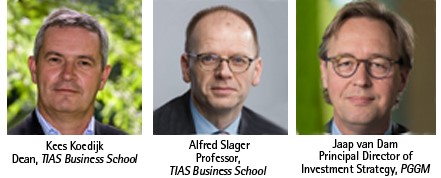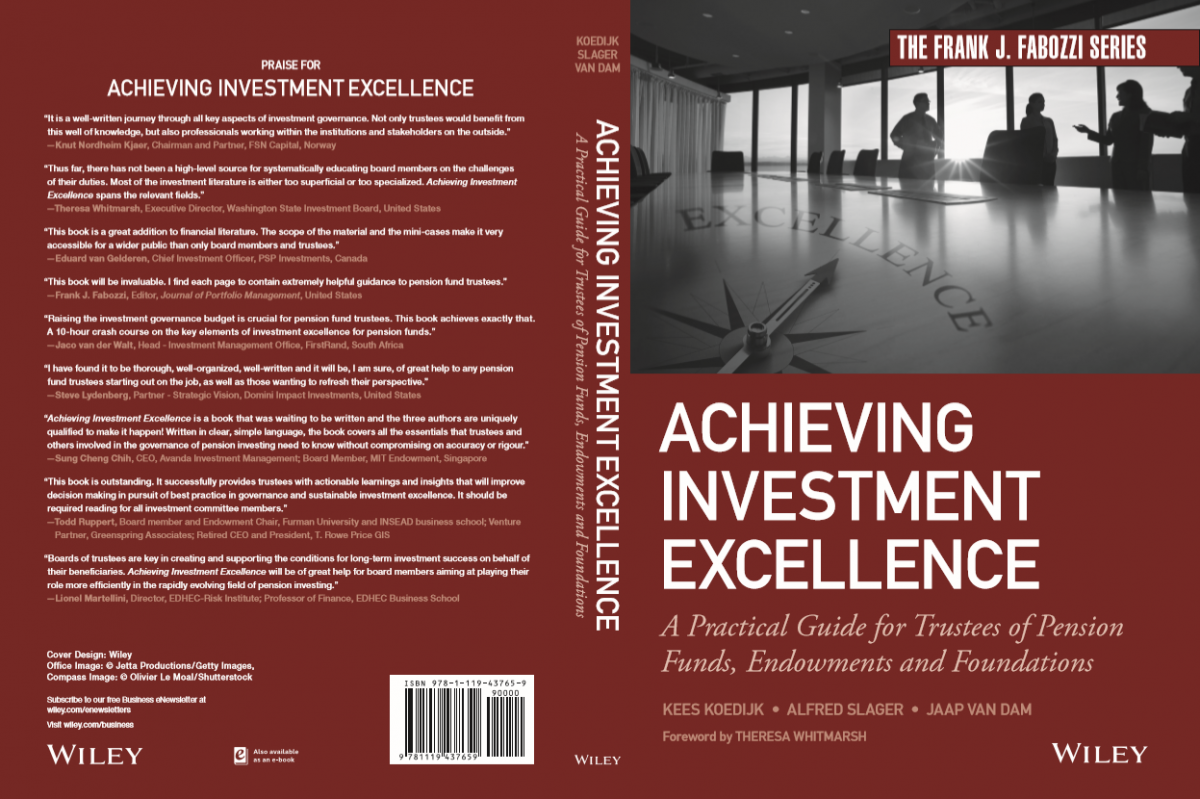
Harvesting the governance bonus
How boards can improve their investment decision-making process?
In this interview, we talk to Jaap van Dam, Principal Director of Investment Strategy at PGGM and Member of the EDHEC-Risk Institute Institutional Advisory Board, Kees Koedijk, Dean of TIAS Business School and Alfred Slager, Professor of Pension Fund Management at TIAS Business School and Trustee at SPH, the Dutch pension fund for General Practitioners, about the release of their new book: “ACHIEVING INVESTMENT EXCELLENCE - A Practical Guide for Trustees of Pension Funds, Endowments and Foundations”. We discuss the content of the book, the main reasons for writing it, the objectives they had in mind and the principal issues faced by trustees. We take a deeper look into the next steps in their mission to help the trustees and the authors conclude by explaining why they have decided to involve EDHEC-Risk Institute in this research work.

Your book "ACHIEVING INVESTMENT EXCELLENCE - A Practical Guide for Trustees of Pension Funds, Endowments and Foundations" has recently been published. Could you give us an overview of the contents of the book?
Jaap van Dam, Kees Koedijk, and Alfred Slager: The book is divided into five parts and follows a clear path. Each part reflects a key board activity that contributes significantly to long-term investment success. The first three parts are mostly about investment content, from shaping the mission and building the strategy (Part 1) to laying the foundation for the actual investment process by formulating investment beliefs, designing the investment process and the investment management organization (Part 2) and the actual implementation of the investments including the evaluation of the outcomes (Part 3). The last two parts are more about the conduct by boards that leads to investment success. Part 4 focuses on becoming an effective board, building a strong investment committee and managing and overseeing the investment organization from the board perspective. The last part of the book is about learning and improving the fund from the perspective of the trustees. This part also contains a chapter that offers boards and trustees step-by-step help to achieve investment excellence by putting the material in the book into practice.
What were the principal reasons you had for writing this book and what objectives did you have in mind?
Jaap van Dam, Kees Koedijk, and Alfred Slager: We have always worked from a simple but powerful premise – a trustee’s daily challenge is how to improve the investment returns and future incomes of their participants. Looking at research, and based on our experience, boards and trustees play a significant role in determining the success – or lack of success – of pension funds, sovereign wealth funds and endowments. Although difficult to measure, an annual opportunity loss of at least 50 basis points of return because of sub-optimal governance and decision-making in the investment field is supported by the outcomes of surveys and many conversations with senior practitioners in the field. Reducing this opportunity loss – or as we prefer to call it, harvesting the governance bonus – can therefore significantly improve the long-term outcomes of pension funds globally. This is even more important in the current low yield – low expected return environment. “Achieving Investment Excellence” has been specifically written to help boards and trustees in a practical as well as evidence based management approach to harvest the long-term governance bonus. We expect that trustees will use our book as a practical handbook to do just that.
The sources of prolonged below-average performance are basically a lack of knowledge and skills; what are the principal issues faced by trustees?
Jaap van Dam, Kees Koedijk, and Alfred Slager: The lack of knowledge and skills lead to worse than expected outcomes and poor decision-making, especially in times of heightened scrutiny from stakeholders and uncertainty where financial markets are heading. For boards to be successful when it comes to investing, it is crucial is to keep the right distance, altitude and horizon. But this is hard work. There is always the temptation to micro-manage and to be short-term oriented. This leads to excessive cost, excessive trading, short-term reactive behaviour and manager churning, all hurting the long-term results. In order to be an excellent board, you have to collectively understand the pitfalls and put serious effort in overcoming them.

The book provides trustees with actionable learnings and insights to help them improve fund performance while remaining faithful to the fund's mission and long-term strategic goals. What are the next steps in your mission to help trustees around the globe?
Jaap van Dam, Kees Koedijk, and Alfred Slager: For starters, we hope that many boards will absorb the messages in this book and, if they are not doing it already, start applying the many practical lessons that we have collected in this book. It is the least that boards can do to improve the long-term returns and future pension payouts for millions of their participants. But our mission does not stop there. As part of the book project, we were personally surprised to find, after a lot of digging, that we are just at the beginning of a whole new research field. As an industry, we research and spend huge amounts of resources on individual investment strategies; but at least as important for future success is the board’s decision-making and policies, where almost no research exists. This issue needs to be addressed. So, we are sounding out potential pension boards and institutes as to whether there is interest to fill these research gaps. We will be pursuing this course to continue to support boards in their investment decision-making in a practical, evidence based way.
Why have you chosen to involve EDHEC-Risk Institute in this research work?
Jaap van Dam, Kees Koedijk, and Alfred Slager: The investment industry is moving from a craft to a manufacturing industry. EDHEC-Risk Institute is one of the top institutes when it comes to creating and improving the highly-engineered building blocks, solutions and tools that help to deliver excellent investment performance. Of course, the application of these tools and building blocks in creating and managing investment portfolios will be primarily in the hands of the investors investing on behalf the institutions that are governed by boards. When the boards and trustees do not keep up, when they do not have the skills, capacity and conduct needed to put these tools to their proper use, they will be the weakest link in the value chain. In other words, for long-term investment excellence, you need both the right content which EDHEC typically creates and the right context which our book helps to provide.
To access the full edition please click on http://www.achievinginvestmentexcellence.com/.
About Jaap van Dam
JAAP VAN DAM is the Principal Director of Investment Strategy at PGGM in The Netherlands. He is chairman of the European chapter of The 300 Club and of the Dutch Association of Investors for Sustainable Development (VBDO). He holds a Master’s Degree in Finance from Erasmus University in Rotterdam, the Netherlands. Jaap’s career in investment management spans more than three decades. He has held many roles within the industry, ranging from fundamental and quantitative analysis to external manager selection and portfolio construction. He joined PGGM in 2005 as Head of Internal Equity Management. In 2006, he was appointed Chief Strategist. Notably, within PGGM he was responsible for developing PFZW’s new investment framework and Investment Strategy 2020. Jaap is a member of ICPM’s research committee and the International Advisory Board of EDHEC.
About Kees Koedijk
KEES KOEDIJK is a professor of Financial Management at TIAS Business School and Tilburg University, the Netherlands. He has won several national and international awards for his research on sustainable development. He has published extensively on finance, responsible investment and pension management. During the last 10 years, he has served at several investment committees of asset institutions and acted as consultant to international pension funds. Kees Koedijk is a co-editor of the Journal of International Money and Finance, and is on the editorial board of the Journal of Portfolio Management. In 2010, Kees Koedijk published the book "Investment Beliefs", together with Alfred Slager. Many funds across the globe have since then adopted the framework on investment beliefs that was developed in the book.
About Alfred Slager
ALFRED SLAGER is an economist, trustee, and advisor who has worked and published widely on issues to help pension fund boards with their strategy and investment management. He is professor at TIAS Business School, Tilburg University, and a trustee at the Dutch pension fund for general practitioners, SPH. He has performed many different roles, generally bridging academic finance and practical investing. Starting out as a portfolio manager in 1995, he spent 15 years as research analyst, investment strategist, and chief investment officer at different pension funds and investment management firms, earning his PhD cum laude in 2005. Alfred serves on several investment committees and supervisory boards of pension funds, as well as on the board of the Dutch CFA Society VBA Netherlands, the largest Dutch society of investment professionals which he helped merge in 2017.

